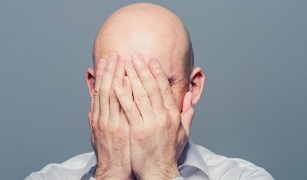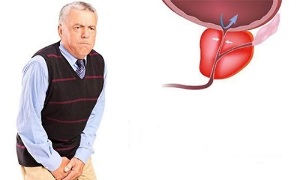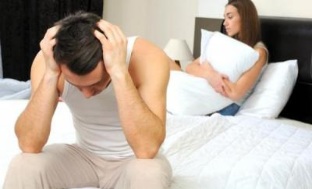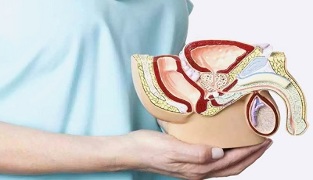
This recessive disease is one of the most common diseases in half of human males. Many people close their eyes to the emerging discomfort, waiting for the development of the inevitable consequences that make normal life impossible. We will tell you the symptoms and treatment of male prostatitis.
Prostatitis is an inflammation of the prostate. According to statistics, it affects a large number of men of any age. At the age of 30, one-third of people have already suffered from this disease. Over the years, the number of patients has increased endlessly. Almost all people who have changed their sixties are facing one or the otherdisease. This is only official data, but in fact the incidence rate is much higher. However, since men are reluctant to see a doctor, the doctor cannot give an exact figure.
has taught boys since childhood that a real man should persevere, endure pain and not pay attention to disease. And you can go to the doctor without any discomfort. Most adult men strictly abide by this rule. In the most extreme cases, even in ambulances or hospitals, adult men will talk to doctors about their problems.
A, this also applies to prostatitis. The first shocking "bell", such as the frequent need to go to the toilet, and sometimes mild pain and discomfort during urination, some problems with libido and strength, can be explained in any of the following ways: a hard day's work, with the bossThe scandal, the previous day’s party was too stormy.
The main thing is that there is nothing to consider, everything will disappear on its own. This is logical: the initial symptoms of male prostatitis are not very obvious, which causes the least inconvenience to the patient and disappears quickly. Only one thing is not considered: the painful symptoms have passed, but the disease itself has not disappeared anywhere. It just becomes a chronic form, and it hasn't manifested in any form for a long time. Then, under the influence of negative factors, it becomes worse and causes more suffering.
Even in your opinion, new health problems are not worth damaging, and will disappear quickly if you don’t receive any treatment, please know that they may be a sign of serious illness. Be sure to see a doctor for examination and necessary examinations. Remember, any disease is easier to cure if treated urgently.
Causes of diseases
Prostatitis can be caused by a variety of factors, which are usually not related to the reproductive system. This is one of the most hidden features of the disease.
Let us list the most common causes of gland inflammation:
- Diseases of the circulatory system in the small pelvis-for this reason, the cause is ranked second. Due to physical inactivity, often sitting at work and at home, leading to blood stagnation, interruption of normal blood supply, and therefore hypoxia in organs. This leads to a significant increase in the size of the prostate. Similar changes have been observed in overweight people.
- Perineal muscles often shake and tighten-certain occupations, such as drivers, are vulnerable to this kind of injury.
- Hormonal imbalance-occurs in many diseases and has a very adverse effect on prostate health.
- Hypothermia.
- Constipation often.
To reduce the possibility of illness, it is necessary to monitor the regularity of sexual activity. Don't forget that long-term abstinence and excessive close contact can have negative effects.
Which diseases are isolated

- Bacterial prostatitis-Caused by pathogenic bacteria. It can be acute (more common in young people) and chronic. Recent studies have shown that, in general, infection will affect the glandular tissue that has been pathologically changed, and is accompanied by severe circulatory system diseases.
- Non-bacterial or non-bacterial prostatitis-Although laboratory tests did not show the presence of pathogenic microorganisms in the diseased organ, it cannot be completely ruled out.
- Prostate pain-There are all symptoms of prostatitis, but no inflammation of the glands is detected.
How does prostatitis manifest
In order to detect the disease in time, you need to know what the symptoms of male prostatitis are. The most typical feature is the acute form of the disease.
- Weakness and general malaise.
- Fever and fever.
- Increased body temperature.
- Headache.
- Severe pain in the perineum and groin area, which is more severe during urination and defecation.
- The need to go to the toilet frequently, shortly after urinating, the patient feels urgent again because the bladder has not been completely empty.
- Acute urine retention shows a serious condition requiring urgent medical care.
- Nervous and irritable.
Symptoms of chronic prostatitis
In the chronic form, the disease can be asymptomatic for many years, and its symptoms can easily be confused with the manifestations of other diseases.
Let us figure out how this disease manifests:
- Pelvic and lower back strain-The pain comes from the perineum and is felt in the lower abdomen, urethra and testicles. In addition, patients feel lower back pain radiating to the legs, which is often mistaken for sciatica or other neuralgia. The pain may be concentrated in one place, or it may seem to be painful together.
- Difficulty and frequent urination-Pain usually occurs when the patient starts or stops urinating. At the same time, it is impossible to bear and retain urine: although the person has been to the toilet recently, it feels like the bladder is full. When urinating in a weak stream, very little urine is released.
- Decreased sexual activity-Long-term inflammatory processes, circulatory system diseases, pathological changes in prostate tissue cannot be wasted, and ultimately lead to a significant decrease in libido and efficacy. This is because the nerve passes through the gland, which transmits the impulse to the brain center responsible for erection. One of the consequences of the disease is the damage to these nerves, their reduced sensitivity and the development of the disease in the intimate sphere. At first, erection does not lose strength, but premature ejaculation occurs at the same time, then the erection itself becomes weak and the orgasm becomes dull. The synthesis of testosterone is gradually suppressed, and libido drops sharply. In some cases, men will feel severe pain in the head of the penis during ejaculation.
- Scarring of prostate tissue and reduction of organ size.In advanced cases, the process spreads to the urinary tract and bladder, causing severe urination disorders. All these lead to the development of renal dysfunction, the development of urolithiasis and other serious conditions.

Treatment of various forms of diseases
We have seen the most common symptoms of prostatitis in men, now let us look at the treatment of this disease.

Despite the fact that there are many studies devoted to the treatment of prostatitis, there is no overall treatment plan so far. The treatment method in each case may be different, but there is no doubt that it is very important to correctly determine the cause of the disease and start treatment in the early stages of pathological development.
In acute prostatitis of bacterial origin, one must be hospitalized, given antibiotic treatment, prescribed anti-inflammatory drugs, analgesics, and drugs to normalize blood circulation.
This chronic disease is difficult to treat and usually cannot be cured completely. In the case of successful treatment, long-term relief can be achieved, during which the symptoms and symptoms of male prostatitis will not appear.
Individually select complex treatment procedures for each patient. Prescribe non-steroidal anti-inflammatory drugs, drugs to improve prostate blood circulation, immunomodulatory drugs, and vitamins for patients. In addition, a person must receive physical therapy, prostate massage, and regular physical exercise designed to maintain prostate health.

























